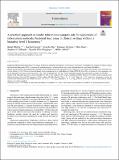A practical approach to render tuberculosis samples safe for application of tuberculosis Molecular Bacterial Load Assay in clinical settings without a biosafety level 3 laboratory
Abstract
Background Mycobacterium tuberculosis is a category B pathogen requiring level-3-containment laboratories for handling. We assessed the efficacy of heat and Guanidine thiocyanate (GTC) to inactivate M. tuberculosis prior to performance of tuberculosis Molecular Bactrial Load Assay (TB-MBLA). Method We performed in vitro experiments using H37Rv reference strain and replicated in sputum specimens. A 0.5 MacFarland standard of M. tuberculosis was serially diluted to 1x10 CFU/mL and pooled sputum was homogenised prior to serial dilutions and Xpert MTB/RIF Ultra. Three replicates for each containing 1 mL for M. tuberculosis and sputum were inactivated at 80 °C for 20 minutes and with GTC for 15 minutes. Inactivated samples were processed for culture and TB-MBLA. Results No M. tuberculosis growth was observed in MGIT for GTC or heat treated H37Rv cultures. All untreated H37Rv dilutions were MGIT positive except the most diluted specimens. Heat and GTC treatment of H37Rv reduced TB-MBLA load by 2.1log10 (P = 0.7) and 1.8log10 (P = 0.7) respectively, compared to controls. In contrast, heat treated sputum had TB-MBLA bacterial load of 3.47 ± 3.53 log10 compared to 5.4 ± 3.1 log10 eCFU/mL for GTC (p = 0.57). All heat and GTC treated sputum were culture negative. Conclusion Heat or GTC renders M. tuberculosis non-viable and eliminates the need for BSL3 laboratory for performing TB-MBLA in routine healthcare settings.
Citation
Mtafya , B A , Qwaray , P , John , J , Sichone , E , Shoo , A , Gillespie , S H , Ntinginya , N E & Sabiiti , W 2023 , ' A practical approach to render tuberculosis samples safe for application of tuberculosis Molecular Bacterial Load Assay in clinical settings without a biosafety level 3 laboratory ' , Tuberculosis , vol. 138 , 102275 . https://doi.org/10.1016/j.tube.2022.102275
Publication
Tuberculosis
Status
Peer reviewed
ISSN
1472-9792Type
Journal article
Rights
Copyright © 2022 The Authors. Published by Elsevier Ltd. This is an open access article under the CC BY license (http://creativecommons.org/licenses/by/4.0/).
Description
Funding: This work was supported by the United Kingdom Research and Innovation (UKRI) for the TB-MBLA translation study in routine healthcare settings through the Food Security and Health for East Africa Project (Grant number# EP/T01525X/1) as part of postdoctoral work for Dr Bariki Mtafya at the National Institute for Medical Research Centre-Mbeya Medical Research Centre, Mbeya, Tanzania with the University of St Andrews, UK.Collections
Items in the St Andrews Research Repository are protected by copyright, with all rights reserved, unless otherwise indicated.

